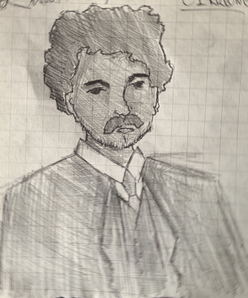Elliott Dupont
| Elliott Dupont | |
|---|---|

| |
| Culture | Cirréonese |
| Gender | Male |
| Race | Human |
| Nationality | International Commune |
| Title(s) | Chairman of the International Commune
(formerly) Vox Populi Cirréone |
| Age | 44 |
| Player | wumbr_ |
Elliott Chantal Dupont was a Communite revolutionary, politician and political theorist, was the founder and first Chairman of the International Commune and was founder and first Vox Populi of the Second Commune of Cirréone. He was the founder and chairman of the (second) Cirréonese Stepanist Party, which led the Firework Revolution that established the Second Commune of Cirréone.
Born an orphan to a working-class family in Felicie, Dupont embraced revolutionary socialist politics, more specifically Stepanism, due to his uncle's Stepanist views and following his admission into the University of Milacieur. Dupont would form the underground Cirréonese Stepanist Party, would lead the formation of several trade unions in Cirréone and lead several strikes, before being briefly arrested for sedition and imprisoned. Following his sentence he would attempt to organise a revolution, however it would only result in several large-scale protest, violently supressed by the Federation government, known as the Felicie Revolt. After several more years of coordination and forming Stepanoff's Guard, the militant wing of the CSP, Dupont would launch the Firework Revolution by executing Manon Giroud, ousting the Federation Government and stablishing the Second Commune of Cirréone. From here, he would form the Paxian-Cirréonese Comintern, which would eventually come to form the International Commune.
Early life
Childhood
⚠️The following information is considered external lore, containing events that did not influence the characters or the world of Cinder.⚠️
Elliott Chantal Dupont was born in Felicie West, an only child and an orphan, with his mother, Marie Dupont, dying in childbirth. Marie Dupont was a prostitute living in Felicie, being the reason behind which she met Dupont's father, Gerard Peurtrov. Peurtrov was an upper-middle class industrialist responsible for managing many FeliCoal sites in Felicie West. As his had mother passed, Dupont was taken care of by his uncle, Pierre Dupont. Pierre Dupont had fought in the June Revolution, 11 years prior, and so would be a large influence on Dupont's political radicalisation. According to those around him, the young Dupont was said to have read a lot in his spare time, being taught to read by his uncle.
When Dupont was 11, his uncle would become paralysed from the hips down in a tragic accident at his work place, forcing Dupont into child labour as to support both himself and his uncle. In this time in which Dupont would be working, his uncle would often discuss politics with him, being his first source of radicalisation. However, when Dupont was 17, his uncle would pass, leaving his entire life savings to Dupont, with which he would attend the University of Milacieur, studying philosophy.
University and political radicalisation
Upon entering the University of Milacieur, Dupont would begin to read into the philosophical works his uncle had recommended to him, namely Black Capital and Capital, And Its Crushing Weight, both by Valerie Stepanoff. Stepanoff's works would resonate deeply with Dupont, who would go on to read her entire catalogue of books in a matter of months, along with works by other Stepanist and socialist writers such as Sebastian Kouzmine and Leon Crivanne. It would also be at his philosophy class where he would meet Paul Grasé, who would become his life-long friend and right-hand man. Following his endeavours into Stepanist theory, Dupont would be invited to the university's League of Stepanists, a Stepanist circle of the University of Milacieur's students, by a classmate. Dupont would also bring along Grasé. Within a very short amount of time, Dupont would grow incredibly popular among the League for his impressive debating skills, evocative speeches, and deep understanding of Stepanoff's works and their principles. At age 19, Dupont would go to found his newspaper, 'Notre Voynée Imprimée' (Our War in Print), a Stepanist publication, under which he would write by the penname 'Edouard Demonde' as to evade prosecution by the Federation Government. The newspaper would quickly gain traction in Stepanist circles as one of their only functioning publications. At age 20, Dupont would graduate from the University of Milacieur with a degree in Philosophy.
Revolutionary activity
Early activism and imprisonment
After graduating, Dupont would form an underground Cirréonese Stepanist Party with Paul Grasé, despite its constitutional banning, drawing in numerous Stepanist intellectuals and activists. From this platform, Dupont would inspire the formation of many trade unions in Cirréone and lead strikes. At the same time, Dupont became a regular patron of the Yellow Farmer, where he would bring political debates, eventually amassing a following in the fellow patrons, who would often come to hear him speak. When Dupont was 26, he would lead a major strike with the Coal Miner's Union, in which he would be arrested and imprisoned for sedition, sentenced to 3 years at the Diyonroux District Prison.
Once he had served his sentence, he decided he should travel and organise with foreign socialists and Stepanists. During this time, he would visit Crannoghold, Kraftia, Saristania, and most notably Paxia, where would meet Láng Jun, revolutionary socialist and future chairman of the Worker's Republic of Paxia. Following his return to Cirréone, Dupont would feel inspired to attempt a revolution.
Felicie Revolt and its aftermath

Aged 30, Dupont would lead a series of large-scale protests in Felicie, in hopes of starting a full-scale socialist revolution in Cirréone, however, the protests remained confined to Felicie as they were quickly violently supressed by the Federation Government, as there was no current militant wing in the Cirréonese Stepanist Party. The Felicie Revolt would be quelled in merely 4 days, and while seen as a failure, it would draw more and more socialist intellectuals into the party, seeing its efforts in the 'War on Capital.' Within a year of the Felicie Revolt, the Cirréonese Stepanist Party would double in membership, and Dupont would begin the militarisation of the party by forming Stepanoff's Army, disenfranchising many sects of the Cirréonese Army and subsuming them into Stepanoff's Army.
⚠️The following information is not considered external lore.⚠️
Over time, Dupont would slowly grow the party until he felt the time right for a revolution, holding off from severe acts and keeping to speeches, reports, and organisation. With the response from Manon Giroud as to the Crannog-Cirréonese border conflict, Dupont would famously give a speech at the Yellow Farmer, claiming it a distraction from the internal struggles in Cirréone and class conflict. Dupont would also famously give a speech on the formation of the Worker's Republic of Paxia, praising it, and calling for a revolution in Cirréone. The tipping point, however, would be with the Cirréonese elections, in which Manon Giroud of the Actuelian Party of the Republican Coalition would be elected Vox Populi Cirréone.

Firework Revolution
The Firework Revolution would begin with the storming of the residence of Manon Giroud, in Léttona, on the evening of the election while Manon Giroud was celebrating his recent election. Stepanist forces would break down the door under command of Dupont, and would set alight to the building. Most guests would be killed by revolutionaries, or would run away. Dupont would then approach Giroud and, after a heated interaction, execute him by means of decapitation. Revolutionary forces would soon after storm and secure their position in the House of Peones, the Cirréonese parliamentary building, and then the rest of the nation, and would declare Elliott Dupont as Vox Populi of the newly formed Second Commune of Cirréone.
Second Commune of Cirréone
The formation of the Second Commune would immediately spark controversy. Immediately following the Firework Revolution, Korallriket would dissolve the Nautilus Defence League. It would also cause much debate as to the ideology of Stepanism and its differences with Revolutionism (to which Dupont would write his report On Revolutionism) with the Revolutionary Internationale inviting the nation several times. However, instead of this, within days of the formation of the Second Commune, the Paxian-Cirréonese Comintern would be formed, a military and economic alliance between The Second Commune of Cirréone and the Worker's Republic of Paxia, by which Paxia would also secede from the RevIntern. Unlike the First Commune, the strong ideology of Dupont and his Cirréonese Stepanist Party would immediately come into effect in the government, centralising the economy and effectively banning any other parties other than the CSP.
It would also be during this period, however, that Dupont would lose his life-long best friend and political partner, Paul Grasé, as he would go missing for a time, during which Grasé would develop his religion of Colipenism. Upon his return, he would disrupt a meeting of the Communal Council of the Poluts by openly criticising both the ideology of Stepanism and the Firework Revolution, to which Dupont would respond by exiling him from the country. This would largely depress Dupont, and forever shake him. In the wake of the joining of the Bardovian Republic to the PCC, and the inevitable onset of the Great War, Dupont, Julius Povski, President of Bardovia, and Láng Jun, Chairman of Paxia, would begin talks of uniting into one, as the International Commune, on the 10th of June, 2024. This would come into fruition following the writing of the Constitution and the announcement of the new nation. Elliott Dupont would be elected Chairman of the International Commune, unanimously.
The International Commune

Almost immediately upon the formation of the International Commune, Dupont would give a speech on the current affairs relating to the Great War, commenting on the imperialism of Ashannar and Aranna in the face of Cauldra, and declaring support of Zimnogóra and their war of independence from Uslanpolj.
Political ideology

Dupont was a devout Stepanist and believes that his interpretation was the sole authentic and orthodox one.
Personal life and characteristics
While incredibly intelligent in the ways of philosophy, politics, economics, and strategy, and being a good speaker, Dupont was famously dogmatic, especially revolving Stepanism, and was often criticised as completely idolising Valerie Stepanoff. Dupont has only briefly found himself in dedicated relationships, mostly in his younger life, commenting that he was "too preoccupied." Dupont was bisexual.